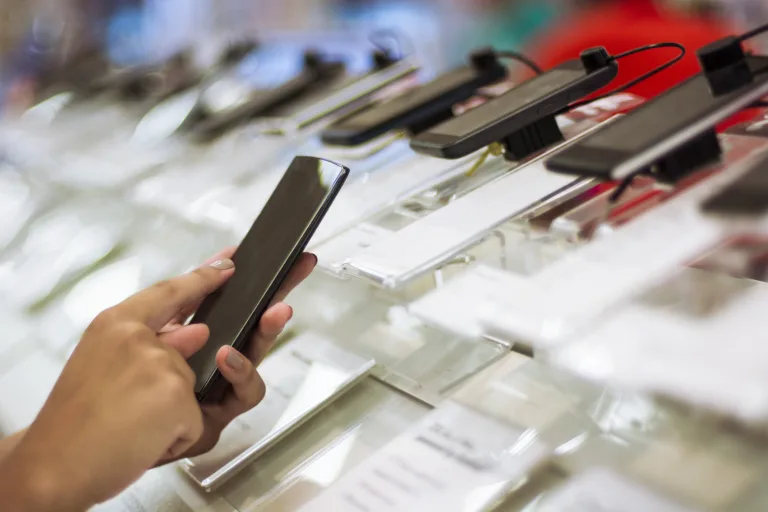Negotiating with a cellphone provider

Canadian cellphone plans can be expensive. Customer service is labyrinthine. The whole experience is hardly a treat. But it can be different! Learn your rights and top tips for negotiating with a cellphone provider.
What you should know
Ads for cellphones must be truthful. That applies whether they appear on TV, in magazines, or on posters in the store.
Service providers can’t sell you a phone for more than the advertised price. If they tell you “that deal is no longer on,” call them on it — show them the ad.
Service providers love to make pitches like: “Our network is the most reliable in Canada.” Ask them to back up these claims. This will let them know you’re a savvy consumer, and it may make it easier for you to negotiate on price later on.
Under the Wireless Code, any salesperson must communicate with you clearly and in plain language. This applies whether they’re dealing with you on the phone, online, or in the store. If something is not clear, ask them more questions until you understand.
Generally they cannot use an unfair practice to get the sale. For example, they can’t tell you that:
the phone or plan is of better quality than it really is
the phone or plan is only available for a limited time if that’s not true
you’re getting a special price, when in fact anybody can get that price
Another type of unfair practice is when a salesperson does something unconscionable, like:
taking advantage of a disability or language issue
charging far more than what’s reasonable
pressuring you to buy when they know you can’t afford it
Careful — you don’t have to actually sign a piece of paper to “sign the contract.” You can agree to a contract with the cellphone provider by:
clicking a link that says you agree to the terms and conditions, or
saying you agree to the terms and conditions over the phone.
The good news is, under the Wireless Code, the contract and related documents must be written in clear, plain language and be easy for you to understand.
The contract must have all the key features (like how much talk/text/data you get, cost per month, and how much the phone costs). If not, you have 30 days from when it starts to cancel the contract.
Any phone a provider gives you must be unlocked. And providers also can’t charge you to unlock your own phone if you’re switching from a different provider.
Starting the first day of the contract, you have a 15-day trial period. During this time window, you’re legally entitled to cancel — for any reason — without penalty.
Careful though: to cancel during the trial period, you can’t have used more than half of your monthly usage limits. You must return the device in near-new condition, with the original packaging.
If your phone turns out to be faulty, you can point to the legal warranty. Under the law, a level of quality, performance and durability is implied into every sale of goods.
You can argue the seller should repair or replace the phone, or give you a refund. It will depend on the situation and also on what your agreement says.
Top 5 negotiation tips
Here are key tips to help get the most out of your phone plan.
You don’t always need 100 GB of data, unlimited overseas calls, or fancy answering machine services. Think beyond the marketing gimmicks. What will you actually use? Lots of “daytime minutes”? Free texting?
Check out what everyone is offering. This is especially important when your long-term contract expires. Prices may have come down. Other providers’ plans may be much cheaper than what you’re currently getting.
Sites like PlanHub, Whistleout or Ratehub help you quickly compare plans and carriers. Spending 5 to 10 minutes here can save you hundreds of dollars a year.
When getting a new phone or plan, don’t feel as if you’re just the “little guy” with no bargaining power. Salespeople are often paid on commission. They want to sell you a plan, and they know you have options.
So play hardball. Ask them for their very best price. Tell them about a better deal from a competitor, and ask them to match it. Include prepaid phone plans in your price comparisons. Be persistent before you sign up!
When you buy a new phone, the salesperson may suggest you buy an extended warranty, or some kind of insurance coverage for your phone. For an added charge the provider will fix or replace the phone if it breaks within the coverage period. Make sure you ask a few key questions before you agree to add this on.
How long is the extended warranty good for?
Is it only repair or replacement, or can I get my money back?
What if it’s my fault — for example, I drop the phone on the floor?
Where do I have to take the phone to get it repaired? What’s the process?
What’s covered under the extended warranty? Is it parts and service, or just parts?
The salesperson must also tell you about any manufacturer’s warranty you already get through your phone manufacturer without the extended warranty. This may cover more than you think!
Make sure you understand the contract before signing. There’s a lot of fine print here for you to review and understand. Fortunately, the salespeople have to give you a summary of the key terms, so at the very least, read this!
Take your time with these decisions. Phone companies want you to think this is a “low commitment” choice, but it can end up costing you.
This information from People’s Law School explains in a general way the law that applies in British Columbia, Canada. The information is not intended as legal advice. See our disclaimer.
Related
On Dial-A-Law
Dial-A-Law has more information on Cellphones in the section on Consumer.
